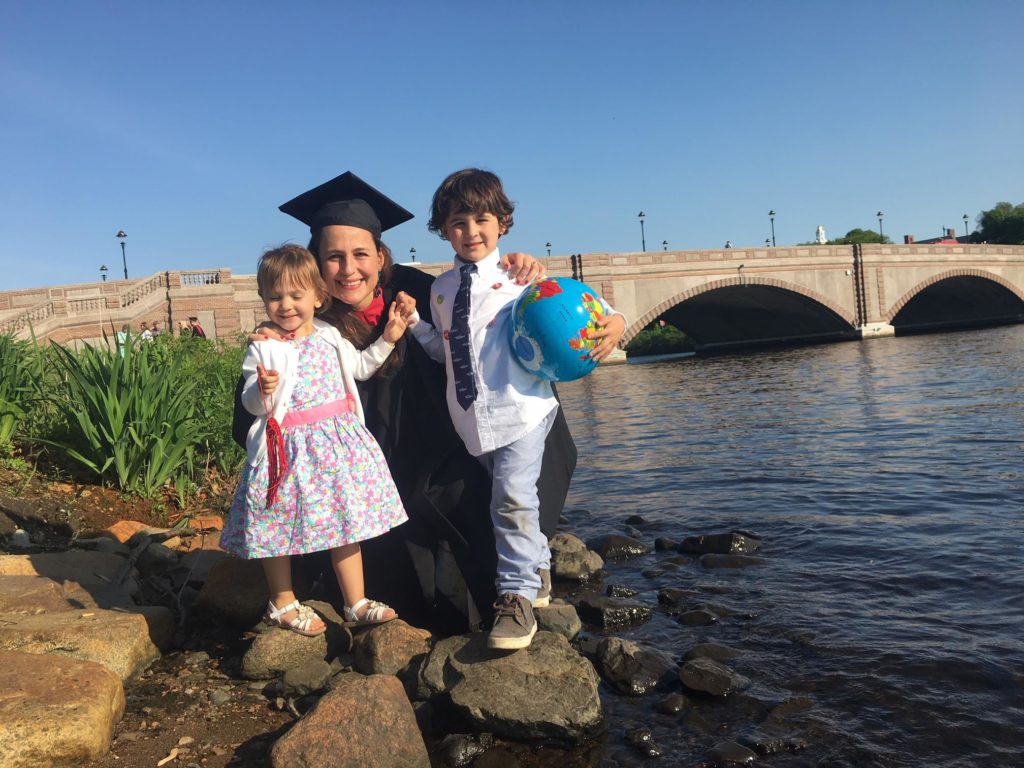Writen by: Carolina Zambrano Barragán
This article was written a year ago, a couple of months after Carolina assumed the role of Program Director at All Eyes on the Amazon.
Originally published at: Ecuadorian Network of Women in Science
I wait anxiously in the garden and feel how the sun hits my face while I shelter under the flowered arupo that we often explore with my brother Patricio. Two minutes later, my grandfather René arrives with a piece of honeycomb in his hand, full of honey dripping between his fingers. My eyes and my soul jump and for 30 seconds I fully enjoy the honey mixed with wax, until the wax turns into chewing gum. I immediately ask my grandfather for another piece, almost with the same energy that my daughter now uses to ask me for a candy or a nougat of panela and machica. It’s 1987, I’m 7 years old and this scene would mark not only my childhood, but my life.
Only a year ago, studying Public Narrative at Harvard, I discovered that it was my grandfather and his bees who led me to study biology and then to specialize in climate change and environment. My training began early, with beekeeping classes for children, mixed with trips to the Ecuadorian Amazon, where we accompanied my mother Lourdes in her field trips as an anthropologist. Images of the bees, my first encounter with a boa, and our boat trip with the Shiwiar and Sapara natives feed my childhood memories. Years later, my field trips as a biologist would fill those images with scientific names of plants, toads and birds.

Biology also took me to the Española island, in the Galapagos Archipealgo, where I did my undergraduate thesis. I studied the influence of the moon on the Nazca boobies and, although it was an incredible experience, it helped me realized that my passion was not to study the behavior of animals, but to try to save them. It was then that I began to work in environment and climate change, especially in the interface between science and politics, and between politics and action. My passion for nature took me to places like Madagascar and Peru, and to study Environmental Management at Yale and Public Administration at Harvard. Despite not having the resources to pay for any of those trips or studies, my brother and my mother always taught me to venture myself, so I found scholarships to train in the best universities and explore the world. Like Valentín, a Colombian colleague at Harvard, says: “You have to raise your hand and take every opportunity that crosses your path”.
My experience and training lead me to occupy important positions in the government and in NGOs in Ecuador and Latin America. I have been Director, Undersecretary and ViceMinister, as well as program manager in regional and international foundations. However, none of those positions and titles would make sense if I was not doing what I am passionate about, which is to look for ways for human development and nature conservation to go hand in hand, as interdependent elements for our existence.
To this end, and unlike some of my female scientist colleagues, I think I found my niche as a “generalist specialist”. I feel science day by day while working on climate action in cities and forests, on mitigation and adaptation, and on technology and innovation. The world we live in is very complex and the responses we generate to current challenges require changes in norms, beliefs and behaviors. This requires soft skills, a training that allows to better understand how the world works, and also patience. The changes that are required are profound and, although we feel the need to push drastic and urgent actions for the world to improve, I think it is key to see this as a marathon not a sprint.
Now I write this text at 10,000 feet, on a flight between Rio de Janeiro and Brasilia. After two master’s degrees, and almost 12 years of work in the government and NGOs in Ecuador and Latin America, my work takes me back to the defense of the Amazon and the Indigenous peoples that live there. That magical world that marked my childhood is under pressure and threatened by extractivism, the expansion of the agricultural frontier and climate change, so some organizations like mine are promoting the use of technologies for forest monitoring and land defense.

In 2050, my son will be my age, and I hope he and his children can know and love what I have seen: eat honeycomb, travel by boat through the Amazon forest, meet the masked boobies in the Galapagos islands, and much more. That is why I hope that children and young people continue studying and doing science to better understand our world and connect with others to translate that science into concrete actions to preserve it. In my case, science – and specifically biology – opened the doors to different roles, it has given me knowledge and filled my head with questions. I hope that many children are lucky enough to experience something similar and that with science they never lose their capacity for wonder.

